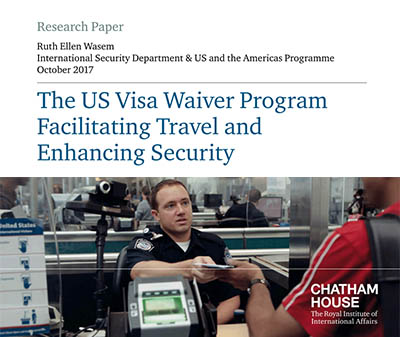Article, Refereed Journal
Chatham House

The U.S. Visa Waiver Program (VWP) has changed substantially over the past 30 years. It originated in 1986 as a pilot public diplomacy initiative to facilitate tourism and reciprocity of travel among countries friendly with the U.S. Since 9/11 the U.S. has leveraged participation in the VWP to gain intelligence to fight terrorism.
VWP admissions make up a significant portion of the tourists and business visitors who come to the U.S. each year. The number of VWP entrants increased by 71 per cent over 20 years, from 12.4 million in FY1996 to 21.2 million in FY2015.
The travel industry's research on the effects of visa facilitation – and of the VWP in particular — shows it yields positive results. The head of the US Travel Association stated in 2015 that the 20.3 million visitors who came to the US in 2014 through the VWP generated $190 billion in economic output and supported nearly 1 million jobs in the U.S.
Weighing the benefits of the VWP to travellers and to the US travel industry against the risks of individuals who pose a threat to national security arriving in the country is no small matter. Critics make the case that the VWP is a major national security vulnerability regardless of the modest economic boost that VWP travellers provide. Supporters of the VWP warn that efforts to scale it back or tighten up the requirements would jeopardize international cooperation in the fight against terrorism with U.S. allies, notably those in Europe.
The VWP is not an especially partisan issue; it has supporters and detractors on both sides of the aisle. Its economic and public diplomacy value has long been recognized. When it was perceived as a national security vulnerability after the 9/11 attacks, policymakers used the VWP's popularity to require biometric passports and to leverage greater sharing of intelligence from participating countries.
Arguably, the value of a national security screening process is dependent on the depth and breadth of the intelligence data. Thus, the relationship between the two dimensions of the VWP has become symbiotic.

